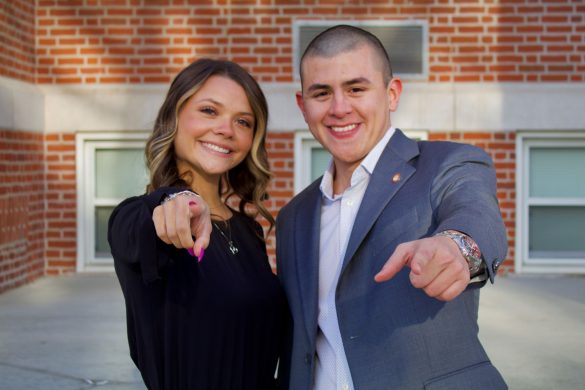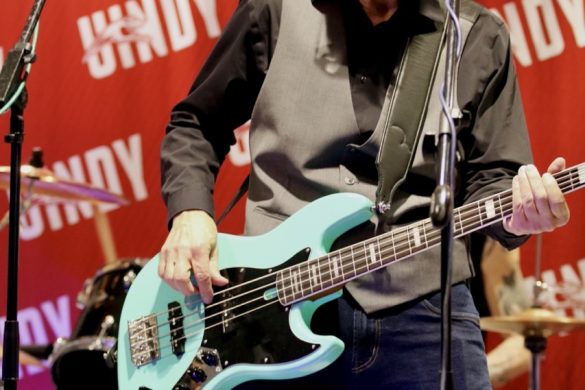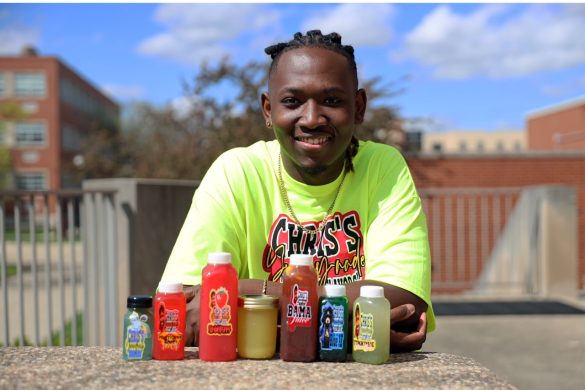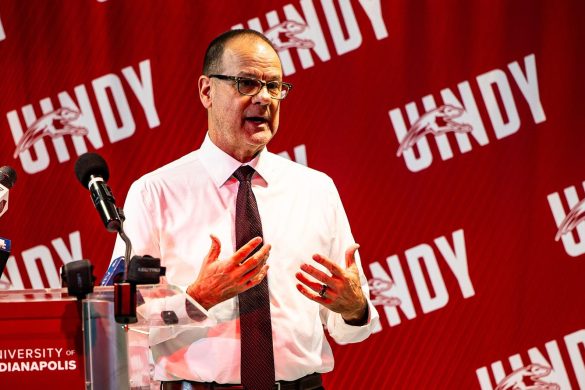The Muslim Student Union and the Office of Ecumenical and Interfaith Programs held a panel discussion on March 3 to discuss what being a Muslim in America is like. The panel was moderated by Professor of Philosophy and Religion Kevin Corn and featured a diverse group of Muslims that included three members of the campus community.
According to sophomore philosophy major and Muslim Student Union President Ahmed Mitiche, MSU chose the panelists to show the diversity of the American Muslim community and to fight stereotypes in the media. The panel was composed of Mitiche, international relations graduate student Fidaa Abuassi, Social Science Faculty Adjunct John Sullivan and Imam Michael Saahir.

(From left) Sophomore philosophy major Ahmed Mitiche, Professor of Religion and Philosophy Kevin Corn, international relations graduate student Fidaa Abuassi, Indianapolis Imam Michael Saahir and Social Science Faculty Adjunct John Sullivan participate in a panel discussion about being Muslim in America on March 3. (Photo by Leeann Doerflein)
“It is important for America to get to know Muslims and Islam, and that not all Muslims are Arabs or from the Middle East,” Mitiche said.
The panelists spoke on several topics including their experiences as Muslims in America and what it is like to be part of a minority religion in a Christianity dominated society. They also took questions from the audience, which packed the Trustee’s Dining Hall.
Mitiche was born in Algeria but has lived in America nearly all of his life. He said his life is a little like the show “All American Muslims,” which is a TLC reality show about U.S. Muslim families. He said that although some people assume things about him based on his religion, he also has had good experiences, and many people can see him as a normal guy.
“My experience has also been positive. I’m a soccer player, and most of the kids on the team have never seen Islam, never known about Islam,” Mitiche. “But when we talk about popular things, it’s different.”
Abuassi said that she, like other Muslims from overseas, has evolved in her faith while living in America. However, she has become stronger in her faith, while others become more Americanized and follow less closely the Islam they practiced in their home country. She also said that not adhering to aspects of American culture sets her apart from her American friends.
“I think you are more self-conscious about the things that you do, like drinking. I never thought of it as a thing, because when I was not exposed to it, I did not think of it,” Abuassi said. “When I was at home I did not practice much. But when I came here, I was like, ‘No, I don’t do that because I’m a Muslim.’”
Sullivan said that he, as a Caucasian, is probably the last person anyone would guess to be a Muslim. He also said that Muslims have become much more visible in society than when he first converted.
“I became a Muslim in 1974, and in 1974 Islam was not thought of as a positive thing, [or] a negative thing; it was not thought of [period],” Sullivan said.
Still today, Sullivan said there is much ignorance of what Islam is. He said that is due, in part, to media messages and Muslims doing a poor job of getting the word out about what they believe.
Sullivan described reading an Islamic book and a Chinese intern pulling him aside to talk about Islam. He said it was clear that the man probably had good experiences in China with Muslims.
“Today, if that same scene were to happen, one could imagine that there might be a very different outcome,” Sullivan said. “Over the years, there has been a real change in what it is like to be Muslim in the United States.”
Sullivan said that Islamic women in the post-9/11 era who cover are courageous and “flags of Islam.”
Abuassi, who does not normally don a hijab, said that when she does cover, she is treated differently by those who know her best without it.
“The same friends, when they saw me cover, they asked, ‘What’s wrong? What are you doing?’ I said, ‘I’m a Muslim. Some Muslim women actually cover their hair,’” Abuassi said. “A friend of mine, he asked, ‘Does this oppress you? Does someone make you do this?’ I said, ‘No, actually this is my choice.’ … I choose to cover, and I choose not to cover. What’s the problem with that?”
Sullivan said that building trust is important for a Muslim. He said that if Muslims establish a relationship with people before revealing their religion, it is much easier for non-Muslims to see past their religion.
“What is important is how you behave before they find out you are Muslim,” he said. “If they feel they can trust you … when they find out you are Muslim, you are just a Muslim.”
Saahir spoke about the history of Muslims in America and gave a bit of insight into his life as a black Muslim and a West side Imam. He said that American Muslims are in a special position and that American mosques are more diverse than one might think.
“I think there is a special contribution [that] we are going to make as American Muslims,” Saahir said. “… Whether you’re from Palestine or Algeria, when you go to a mosque in your home country, everyone looks the same. But when you come to America and go to a mosque, everyone looks different. You’ve got Filipinos, you’ve got Malaysians all in the same mosque.”
Senior communication major Sitav Elturan said that she was surprised by how interesting the discussion was and impressed by the variety of viewpoints and the diversity of the panel.
“There were so many different people up there,” Elturan said. “… And they were all Muslims.”








